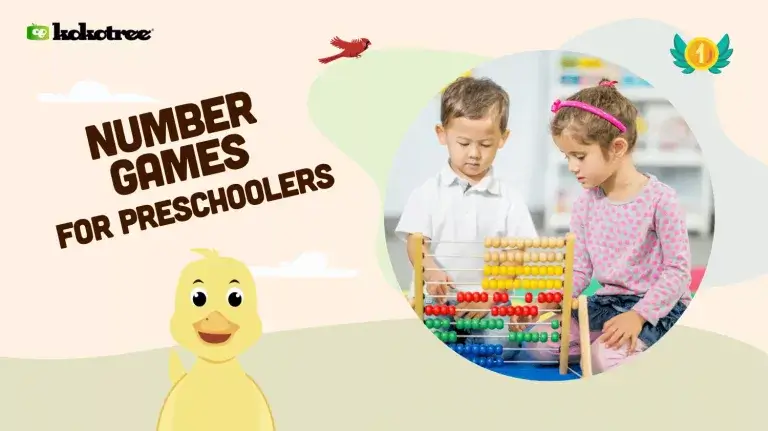

I’ve always believed in the power of learning through play. It’s a fun and effective way to introduce preschoolers to the world of numbers. Number games for preschoolers stimulate their minds and develop their basic math skills.
From counting games to number recognition, there’s a whole world of number games out there. They’re designed to make learning an enjoyable journey for your little ones. And the best part? You don’t need to be a math whiz to guide them through these games.
Delving further into the importance of number games, these preschool math activities benefit preschoolers. These games are designed to boost children’s cognitive development and improve their numerical skills, making them pivotal learning tools.
Children in their preschool years are like sponges, ready to soak up the world around them. A fantastic way to encourage cognitive development during this stage is with number games. These types of games stimulate a child’s problem-solving traits and strategic thinking. As children experiment with different solutions to a puzzle or try to understand the rules of a new game, they’re honing their cognitive abilities. The concentration and focus developed have a large positive impact on their learning process overall.
One of the key cognitive benefits preschoolers can gain from number games is enhancing their memory. Game rules require children to remember the significance of numbers or patterns, further improving their cognitive abilities.
Number games for preschoolers go beyond just cognitive development. They’re essential for building a strong foundation of Numerical Skills. When a child starts recognizing that numbers are not merely quantities but entities with different values and meanings, they’ve taken a substantial step in understanding math.
In the process of playing, preschoolers become familiar with number recognition, counting, and building a comprehension of basic mathematical operations such as addition and subtraction. Playing these games regularly helps children to develop a natural feel for numbers. For instance, one visible transformation is when a preschooler progresses from counting on fingers to being able to mentally calculate.
So, Number games do not just serve as an entertaining pastime. They’re a valuable learning tool that benefits both cognitive and numerical skills of preschoolers. Yes, these little ones are having fun, but they’re also building a robust foundation for their future learning experiences.
Diving further into the fascinating world of number games, let’s explore various types that are gaining popularity among pre-school educators. These games aren’t just fun-filled; they pack a punch in enhancing cognitive abilities as well!
Counting games are a hit among preschoolers because they’re simple yet challenging. Games such as “Count the Objects,” where children must count objects lying around, and “Hopscotch,” based on number squares, are perfect examples. As they play, the young learners improve their counting skills and understand the concept of number sequences.
Matching games can ignite curiosity and improve memory. Games like “Number Memory,” where players match numbers to respective quantities, or “Snap,” where players match similar number cards, are a major hit among kids. They are not just good pastimes; they help children recognize numbers and understand their value, laying a solid foundation for math skills.
Last but not the least, sorting games. Known for enhancing strategic thinking, these games push the little ones to arrange or group items based on size, color, shape or category. Games like “Number Sorting,” where they have sort numbers from lowest to highest or vice versa, and “Size Sorting,” where kids sort objects based on size or weight, are instances of such games.
Incorporating number games into a preschooler’s daily routine isn’t as complex as you might think. The beauty of such games is their flexibility. They can be woven into everyday activities with little to no difficulty.
Start off your morning with counting games. Making them a part of breakfast time can be fun and educational. While preparing cereal or pouring juice, ask your child to count off the number of scoops or predict how many times the juice carton will need to be tipped to fill a glass. It’s practical, it’s simple, and it easily melds into the morning routine.
As the day progresses, try to include matching games into your activities. If you’re out shopping or taking a walk in the park, encourage your child to spot and match numbers. They could match number of birds in the park or cans on a shop shelf. This will not just keep them engaged but will also boost their number recognition skills.
Making sorting games a part of house cleanup time can also be really helpful. Ask your child to sort their toys based on the number of similar items or based on their sizes. This will stimulate their strategic thinking and help them to understand number values intuitively.
Let’s not forget about bedtime routines. Before tucking them in, read them a book that has a numerical storyline. ‘The Very Hungry Caterpillar’ is a classic I recommend often. The caterpillar’s journey of eating through a various number of items each day will act as a perfect end to the day filled with number games.
By incorporating these number games into their daily routine, you’ll not only keep them entertained but also assist in the development of their mathematical skills.
It’s clear that number games can be a fun and engaging part of your preschooler’s day. Weaving them into daily routines makes learning math skills feel less like a chore and more like play. From counting games at breakfast to sorting games during cleanup, there’s a perfect opportunity to learn at every turn. Don’t forget that bedtime stories with a numerical twist can also reinforce these concepts. So why not make math a part of your child’s daily routine? You’ll be nurturing their mathematical abilities while keeping them entertained. It’s a win-win situation!



